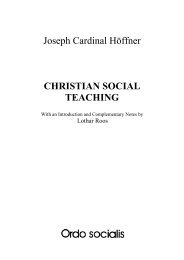Prof. Franz Josef Stegmann Bethlehem Social ... - Ordo Socialis
Prof. Franz Josef Stegmann Bethlehem Social ... - Ordo Socialis
Prof. Franz Josef Stegmann Bethlehem Social ... - Ordo Socialis
You also want an ePaper? Increase the reach of your titles
YUMPU automatically turns print PDFs into web optimized ePapers that Google loves.
<strong>Stegmann</strong><br />
3.2 Main aspects of a critical judgement of <strong>Social</strong> Market Economy from the perspective<br />
of Christian <strong>Social</strong> Teaching<br />
How is the <strong>Social</strong> Market Economy in the outlined understanding of European neoliberalism<br />
judged by Christian <strong>Social</strong> Teaching?<br />
3.2.1 Christian <strong>Social</strong> Teaching agrees with the concept of economic competition<br />
In principle, free market and fair competition are to he approved. I refer to the late Jesuit<br />
Father Oswald von Nell-Breuning. He was a foremost social scientist and theologian, a doyen<br />
of Christian <strong>Social</strong> Teaching who as a young lecturer had worked out the draft of the<br />
Encyclical Quadragesimo Anno of 1931. Von Nell-Breuning had great influence on the development<br />
of Christian <strong>Social</strong> Teaching (and after 1945, on German social policy). His whole<br />
life committed to the trade union movement. he could not he suspected of sympathy with any<br />
kind of capitalism. After World War Two. Germany's industry was destroyed and its economy<br />
ruined. In this disastrous situation, Von Nell-Breuning demanded in 1948: "First get market<br />
economy going as much as possible" 66 and eliminate the centrally planned and controlled<br />
economic system.<br />
The main reasons for this assertion were - and are as follows: material resources, when<br />
compared with the material needs of mankind, are in short supply. The commandment of<br />
solidarity demands, therefore, that sufficient material goods necessary for life are made<br />
available to as many people as possible. Competition and market - more than all the other<br />
economic systems we know to date - are able to utilise the scarce and limited economic<br />
potential in the best possible way and thus, on the whole, to stimulate a more productive<br />
activity.<br />
The above-mentioned statement by the English Bishops states that: "No other system has so<br />
far shown itself superior in encouraging wealth creation and hence in advancing the prosperity<br />
of the community, and enabling poverty and hardship to be more generously relieved.<br />
Centrally commanded economies, in contrast, have been seen to be inefficient, wasteful, and<br />
unresponsive to human needs." 67 Economic inefficiency and the squandering of resources in<br />
the socialism that actually existed and which has broken down in our time, are an obvious and<br />
concrete proof. In this context, therefore, the Pastoral Letter Centesimus Annus of 1991<br />
emphasises:<br />
"Certainly the mechanisms of the market secure advantages: they help to utilise resources<br />
better they promote the exchange of products: above all they give central place to the<br />
person's desires and preferences." 68<br />
The more the volume of goods necessary for life can be increased and the more consumption<br />
of limited resources can be decreased - for example, the consumption of scarce energy and the<br />
demands made on the natural environment to produce these goods - the less the living<br />
conditions of future generations will be burdened.<br />
66 Oswald von Nell‐Breuning, Address at the 1st meeting of the Advisory Council of Economic Administration.<br />
23‐24 January 1948 in Königstein im Taunus (shorthand record), in: Oswald von Nell‐Breuning, Wirtschaft und<br />
Gesellschaft heute, Vol. 1, Freiburg 1956. 156‐158. 158.<br />
67 The Common Good (1996), No. 78 (see note 28).<br />
68 John Paul II, Centesimus Annus (1991), No. 40,2.<br />
28















